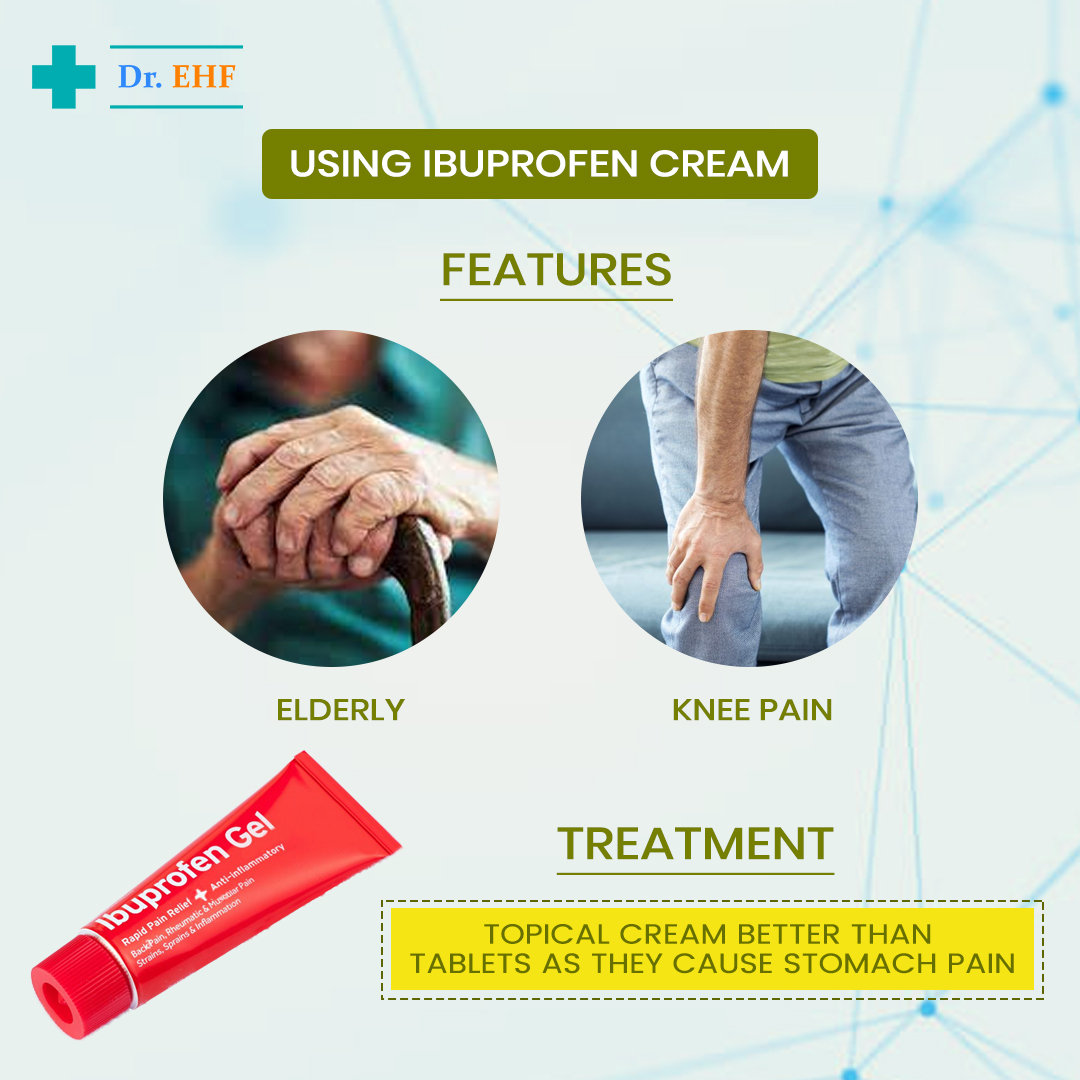ABSTRACT: -
Should elderly use ibuprofen cream rather than tablets and if yes then is it effective. A scientific study was undertaken to determine whether elders with recurring knee pain should be advised to use anti-inflammatory skin ointments skin application, or take tablets.
Around 26 general practitioners were included in this study. Patients above 50 years with knee pain for atleast 3 months were selected in two groups: -
A. 282 patients in randomized study and
B. 303 patients in a preference study.
It is believed that if topical (locally applied on the skin) treatment is as effective as oral treatment, then why not prefer topical usage, because they do not give rise to huge side effects to the patients as happens when elderly take oral tablets This also improves the quality of life.
Doctors after checking body parameters of these patients, then took their permission and asked them to stop taking any painkillers or anti-inflammatory medicines before starting the study.
A starter pack of the medicine was given to the patients of their choice and were then asked to continue their treatment by further buying from their pharmacies. The Nurses were fully trained to conduct the study.
After 3, 6, 12, and 24 months of treatment, a postal questionnaire, with reminders, was sent to these patients, followed by blood tests at 12 and 24 months. Since recruitment of patients was slow, followup of patients was delayed. In the randomized group patients were either given a choice of either topical or oral ibuprofen medicine, whereas in the preference group patients were allowed any method they liked, and after using the starter pack, they could buy it from their pharmacies.
PRESCRIBING DATA: -
After the first 12 months the questionnaire evaluated symptoms such as knee pain, disability, stiffness and physical function of the knees. For oral medicines, 1.2 gms daily dose was given, and for topical application 1.5 gms per knee was given, however, more patients preferred topical application rather than oral tablets, as per reviewing of prescriptions during the study. Apart from the 6, 18 and 24 months results analysis, an End of Study analysis was also carried out using the last followup data collected at the end of the study.
In particular, there was no significant difference between the two groups selected, except for some changes in their use of topical and oral anti-inflammatory medicines. In the preference group 89 percent had taken oral medicines, and 28 percent used skin creams, while in the topical group, oral and local skin applications was 5 and 35 percent respectively. In the randomized group, patients preferred oral treatment over the topical group.
Hence it was very clear that there was no significance in scores achieved between topical and oral groups. Also, side effects between the two groups were almost similar.
OUTCOME: -
There was not much difference in figures at the end of study, only in the oral group there was slightly less pain related disability after three months of initial usage. There was no significant difference in use of ' rescue medication ' or change of medicines due to side effects in both groups.
DISCUSSION: -
(Main findings) It was clear that use of either oral or topical medicines gave similar relief and outcome for both the groups, having used medicines for over a year. However, few patients on topical medicine reported more pain and disability at the end of three months, and that some patients stopped treatment due to lack of satisfactory relief, although overall there was not much difference in the results; the oral group reported few side effects including changes in blood picture status. 9 percent of patients in the oral group also reported breathing problems and had to stop treatment.
PREFERENCES: -
Patients preferred to use topical medicines rather than oral medicine, but those having more pain chose oral tablets rather than topical cream. Patients who chose topical cream were older in age and from lower social class and hence oral medicines are to be avoided in elderly patients, looking at the chances of side effects.
MEANING OF STUDY: -
It is now very certain that the results of this study in both groups are almost the same, however at the end of 3 months, slight difference in degree of pain reduction was noticed in both groups. In case of inadequate pain relief in the topical group, patients preferred the oral route. Advice to use topical medicines might be a good alternative rather than oral route, especially for elders in knee pain.
CONCLUSION: -
General practitioners who treated old patients with knee pain, advised topical medicine for local application on the knees, rather than oral anti-inflammatory tablets, which gave almost the same relief from pain, minus the side effects and lower treatment costs, due to less need for antacids or gastritis medicines.
Compiled from various international research journals available at google scholar by D. Mukherjee having 38 years of pharmaceutical (Cardiac, Diabetic, Neurology, Pain & Inflammation products) experience with a Swiss Multinational Company NOVARTIS and edited by Dr Sandeep Ahlawat, MBBS
